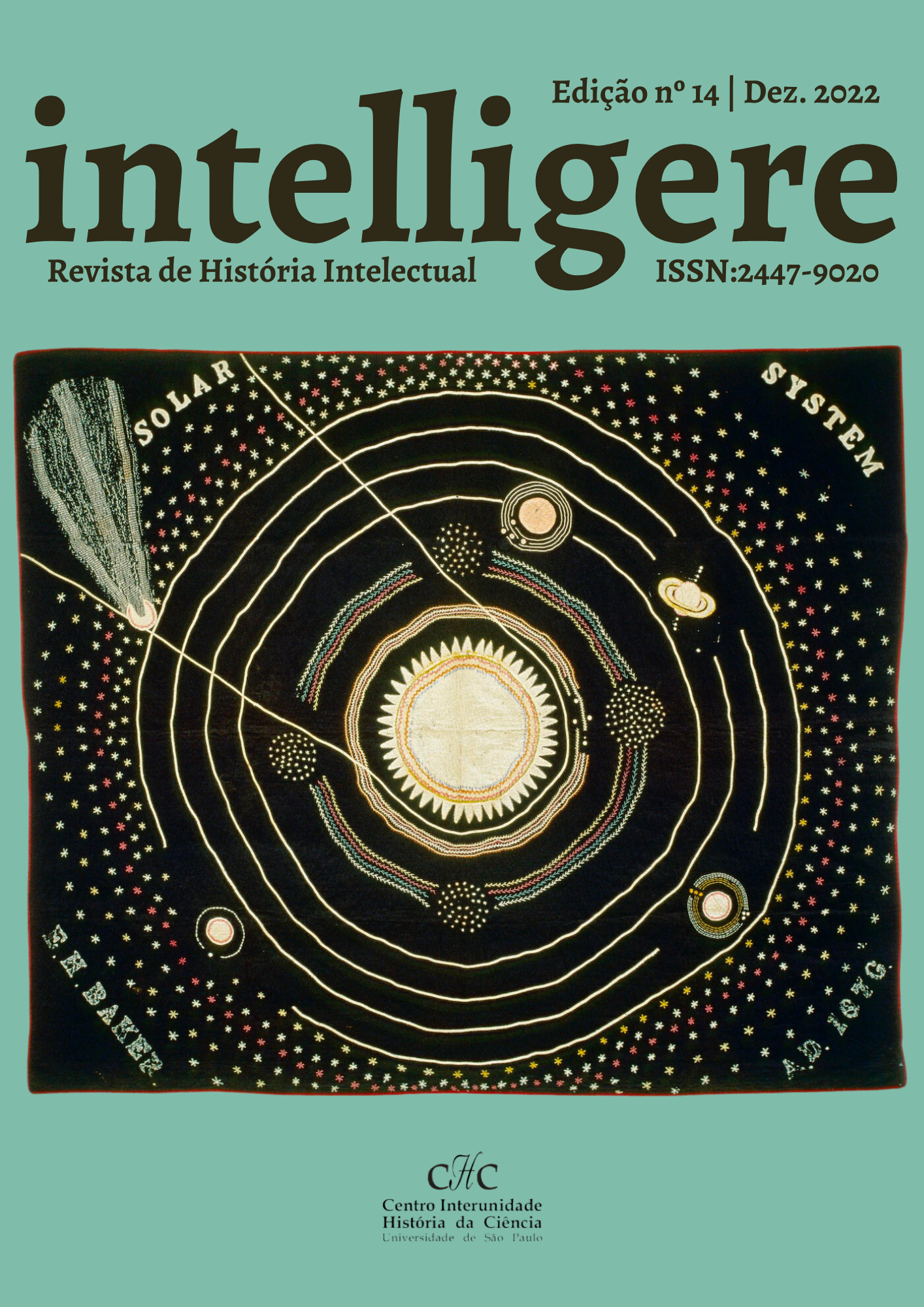Historia intelectual, entre alcances y límites. El accionar de los sujetos para la determinación de lo político.
DOI:
https://doi.org/10.11606/issn.2447-9020.intelligere.2022.207501Palavras-chave:
Política, Acción, Sujeto, Intelectuales, HistoriaResumo
Uno de los aportes más relevantes del pensamiento posfundacional y de la historia intelectual ha sido reflexionar sobre la construcción de todo orden político, en los términos de Carl Schmitt, el cual es resultado del accionar de los sujetos históricos; especialmente de los intelectuales ya que son los encargados de elaborar determinados discursos, siempre en circunstancias concretas y delimitadas, que dan forma al entramado político y social que ellos mismos integran. Por lo tanto, siempre existe una fisura en lo político que es necesaria para su funcionamiento porque permite la actuación de hombres y mujeres, pero, al mismo tiempo, es la que se intenta resolver a la hora de elaborar un orden que permita la vida en comunidad. En resumidas cuentas, lo político siempre es contingente y son los sujetos los encargados de actuar en dichas circunstancias.
Downloads
Referências
ALTAMIRANO, C. Intelectuales. Notas de investigación sobre una tribuinquieta. Buenos Aires: Siglo XXI, 2013.
ALTAMIRANO, C. Para un programa de historia intelectual y otros ensayos. Buenos Aires: Siglo XXI, 2005.
BADIOU, A. El siglo. Buenos Aires: Manantial, 2005.
BAÑA, M. Quien no extraña el comunismo no tiene corazón. De la disolución de la Unión Soviética a la Rusia de Putin. Buenos Aires: Crítica, 2021.
COMTE, A. Discurso sobre el espíritu positivo. Buenos Aires: Aguilar, 1950.
DARNTON, R. El beso de Lamourette. Reflexiones sobre la historia cultural. Buenos Aires: FCE, 2010.
GALLI, C. Genealogía de la política. Carl Schmitt y la crisis del pensamiento político moderno. Buenos Aires: UNIPE, 2018.
GALLI, C. La mirada de Jano. Ensayos sobre Carl Schmitt. Buenos Aires: Siglo XXI, 2011.
GERMANI, G. Sociología de la modernización. Buenos Aires: Paidós, 1969.
KOSELLECK, R. Futuro pasado. Para una semántica de los tiempos históricos. Barcelona, Paidós, 1992.
HOBBES, T. Leviatán. Buenos Aires: Losada, 2011.
MARCHART, O. El pensamiento político posfundacional. La diferencia política en Nancy, Lefort, Badiou y Laclau. Buenos Aires: FCE, 2009.
MELLE, U. La fenomenología de la voluntad de Husserl. Ideas y Valores. Bogotá, N° 95, agosto 1994, pp. 65-84.
MOUFFE, C. Agonística. Pensar el mundo políticamente. Buenos Aires: FCE, 2014.
PALTI, E. J. Una arqueología de lo político. Regímenes de poder desde el siglo XVII. Buenos Aires: FCE, 2018.
PALTI, E. J. Verdades y saberes del marxismo. Reacciones de una tradición política ante su “crisis”. Buenos Aires: FCE, 2010.
PORTANTIERO, J. C. La producción de un orden. Ensayos sobre la democracia entre el Estado y la sociedad. Buenos Aires: Nueva Visión, 1988.
RICOEUR, P. Historia y verdad. Buenos Aires: FCE, 2015.
ROGGERONE, S. ¿Alguien dijo crisis del marxismo? Axel Honneth, SlavojŽižek y las nuevas teorías críticas de la sociedad. Buenos Aires: Prometeo, 2018.
ROSSI, M. A. Lacan y el posfundacionalismo. In: ROSSI, M. A. y MANICELLI E. (comps.) La política y lo político: en el entrecruzamiento del posfundacionalismo y el psicoanálisis. Buenos Aires: CLACSO-IIGG, pp. 15-40, 2020.
SCHMITT, K. El concepto de lo político. Buenos Aires: Folios, 1984.
SCHOPENHAUER, A. El mundo como representación y voluntad. Buenos Aires: El Ateneo, 1950.
STAVRAKAKIS, Y. Lacan y lo político. Buenos Aires: Prometeo, 2007.
ŽIZEK, S. El espinoso sujeto. El centro ausente de la ontología política. Buenos Aires: Paidós, 2001.
Downloads
Publicado
Edição
Seção
Licença
Direitos autorais (c) 2022 Eduardo Nazareno Sánchez

Este trabalho está licenciado sob uma licença Creative Commons Attribution 4.0 International License.
Autores que publicam em Intelligere concordam com os seguintes termos:
- Autores mantém os direitos autorais e concedem à revista o direito de primeira publicação, com o trabalho simultaneamente licenciado sob a Licença Creative Commons Attribution que permite o compartilhamento do trabalho com reconhecimento da autoria e publicação inicial nesta revista.
- Autores têm autorização para assumir contratos adicionais separadamente, para distribuição não-exclusiva da versão do trabalho publicada nesta revista (ex.: publicar em repositório institucional ou como capítulo de livro), com reconhecimento de autoria e publicação inicial nesta revista.
- Autores têm permissão e são estimulados a publicar e distribuir seu trabalho online (ex.: em repositórios institucionais ou na sua página pessoal), com reconhecimento da autoria e publicação inicial nesta revista.




